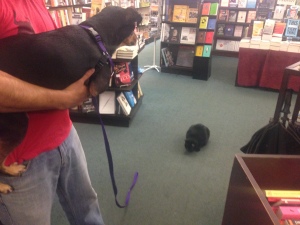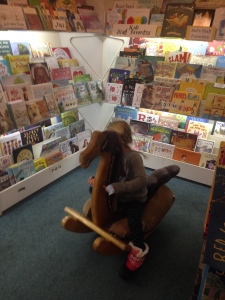Today is Indy Bookstore Day and neighborhood bookshops nation-wide are doing things to celebrate. I thought I’d mention, not what Annie Blooms, my neighborhood indy, is doing to celebrate the day, but what Annie Blooms does every day and has done for more than three decades. Things Amazon will never do for you.
I thought I’d mention, not what Annie Blooms, my neighborhood indy, is doing to celebrate the day, but what Annie Blooms does every day and has done for more than three decades. Things Amazon will never do for you.
Make you a c up of coffee.
up of coffee.
Even Amazon’s much anticipated drone delivery is not going to deliver you a piping hot cup of coffee. Its true that you can buy a latte at the in-store coffee shop at Barnes & Noble. Powells was the industry leader in bringing a coffeeshop into the bookstore. Guess what? The coffee here is free. Always has been. Pour yourself a cup. Settle in. We’ve got all day to spend with you.
Entertain your children while you shop
Our rocking dragon has been keeping toddlers and preschoolers happy for decades. There’s a bin of toys under the board book shelf along with kid sized tables and chairs. It’s safe, it’s clean, and there’s not a single video screen or electronic gadget to distract your kids from the important business of play.
Provide window art for the neighborhood.
We support a regularly rotating visual feast on your walk to the dog park, a new theme every other week or so.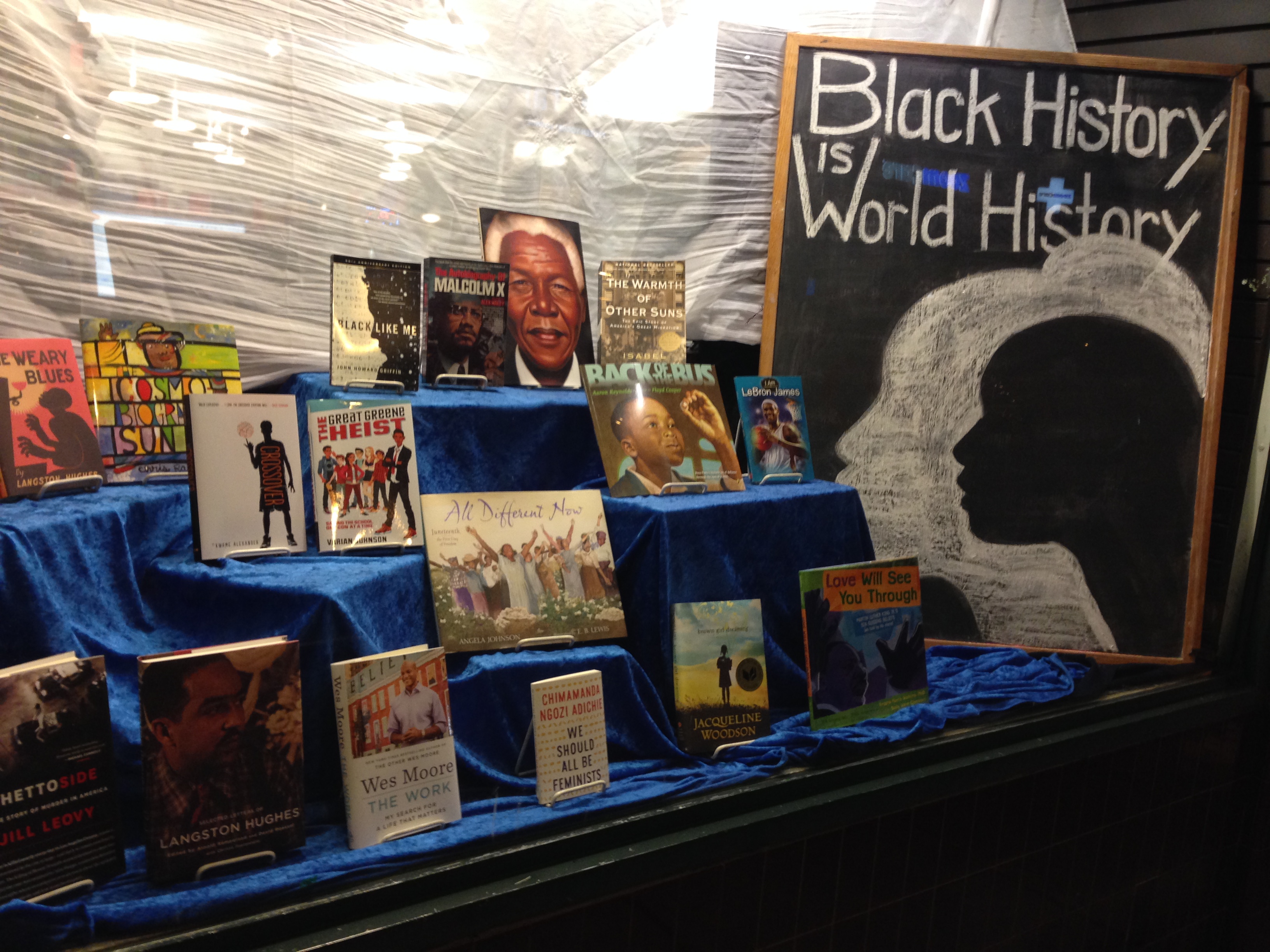 Here we are celebrating Black History month and honoring the Charlie Ebdo victims.
Here we are celebrating Black History month and honoring the Charlie Ebdo victims.
This visual feast is brought to you by our very own bookstore artist, the amazing…drum roll please… Kate Stone!
Support local schools and libraries
We are always happy to welcome teachers to our store. Glad to chat with you about that special book for a particular student. Love to give you a heads up on the newest book from your favorite author. And if you are using the book in your classroom, there’s a teacher discount. Though Annie Blooms has not done this in the past, many children’s bookstores will help you host an author visit to your school. Oh yes, and your local bookstore pays taxes to support your local school district and public library. Amazon? Not so much.
Host live author events
We host about a half dozen author events a month. That’s an hour worth of entertainment with some terrific talent both local and distant. We feature authors of fiction and non-fiction, poetry and prose, adults books and children’s, debut authors and veterans of 50 books or more. Do we charge for these events? Nope. We’re happy to celebrate the books and author we love.
Offer meeting space for your book club
 Have you always wanted to start a book club but dreaded the work of having a crowd of people over to your house? We love crowds of people! Our cosy loft is ready and waiting for the book club of your dreams. And when you’ve settled on your next title, we’ll gladly order everyone a copy and extend our usual book club discount.
Have you always wanted to start a book club but dreaded the work of having a crowd of people over to your house? We love crowds of people! Our cosy loft is ready and waiting for the book club of your dreams. And when you’ve settled on your next title, we’ll gladly order everyone a copy and extend our usual book club discount.
Send presents for you child’s birthday
Hoping to instill the love of reading in the children and grandchildren in your life? Us too. Sign up for our birthday club and we’ll send your children a birthday postcard and gift certificate every year until they turn twelve.
Special Orders
Having trouble finding a book? Can’t quite remember the title or the author? No worries. We’ve got several data bases and a staff full of avid readers who probably know the book you’re thinking of. If it’s in print we can probably get it for you.
Presents! Oy!
 Need some help brainstorming the perfect gift for the quirky child in your life, the persnickety aunt, the edgy nephew, the grandpa who’s read everything? Let’s talk. There’s a just right book for everybody and we’ll help you find it and wrap it up. Dashing to a last minute birthday? Call us and we can have the perfect picture book wrapped and ready for you!
Need some help brainstorming the perfect gift for the quirky child in your life, the persnickety aunt, the edgy nephew, the grandpa who’s read everything? Let’s talk. There’s a just right book for everybody and we’ll help you find it and wrap it up. Dashing to a last minute birthday? Call us and we can have the perfect picture book wrapped and ready for you!
But best of all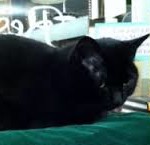
We are here. In your neighborhood. Every day. Stop in. Chat. Browse. Pet our store cat Molly. Not just on Indy Bookstore Day but every day.










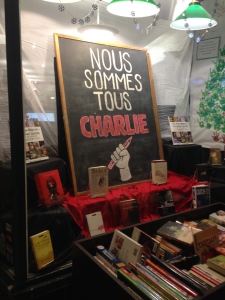 h, and their willingness to go to great lengths to help a patron find the book they want. So in the wake of the Charlie Hebdo killings in Paris this was my bookstore’s response. I have a lot to learn about bookselling but here are some things I’ve learned in the last few months.
h, and their willingness to go to great lengths to help a patron find the book they want. So in the wake of the Charlie Hebdo killings in Paris this was my bookstore’s response. I have a lot to learn about bookselling but here are some things I’ve learned in the last few months.